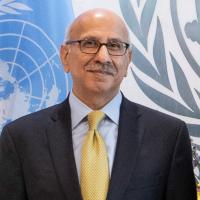
It is my pleasure to share with you the key messages from the 2023World Public Sector Report. The report offers valuable insight into what Governments can do to strengthen the role of the public sector in achieving the Sustainable Development Goals.
Good governance and effective public institutions are not an end in themselves, but a critical foundation for securing the transformational changes required to achieve the SDGs.
These transitional changes will have to be pursued in the very challenging circumstances, which include the lingering effects of Covid-19, climate stress, rising inequality, and slowing growth and conflicts. In this context, the perspectives taken by this edition of the World Public Sector Report could not be more timely.
These shocks and negative trends, especially COVID-19 pandemic revealed globally, the best and the worst about the readiness, responsiveness, and resilience of the public sector. The lessons learned from the pandemic are fertile ground for shaping the long-term strategic and fundamental shifts necessary for the public sector to be fit for pursuing the 2030 Agenda for Sustainable Development.
The report outlines how, by capitalizing on successful innovations undertaken during the pandemic, Governments can make institutions more effective and resilient to shocks, more forward-looking, and able to steer societal change in positive ways.
The report points to three key areas for action:
First, rebuilding trust in public institutions. The report draws attention to the growing expectation of fairness within societies. This is partly triggered by the reality of the disproportionate impacts of the COVID-19 pandemic both within and across countries. Three ways to build trust are (a) fostering greater accountability to their citizens and ensure greater transparency; (b) Upholding human rights and values in public service structure and delivery, and (c) ensuring public engagement, including through inclusive and participatory approaches in planning and decision-making.
In short, trust begets trust. Governments can greatly improve their credibility with the people, including by engaging and empowering non-State stakeholders in society. This improved credibility can, in turn, positively impact people’s perceptions of the legitimacy of Government decision-making, particularly when trade-offs are required.
This brings us to the second key action area. This is about leveraging synergies and managing trade-offs across seemingly competing development priorities. The interdependencies across the Sustainable Development Goals and Targets, can help drive synergetic approaches that drive change across multiple sectors and groups. Governments could use a range of processes, mechanisms, and tools to realize these benefits. But the most effective way is aligning public spending with the SDGs.
National budgets provide a critical entry point for policy prioritization. This is particularly important in the current context faced by most countries, which is characterized by high debt burdens and reduced fiscal and policy space. A clear understanding of the relationship between public spending and sustainable development outcomes is crucial. The Integrated National Financing Frameworks (INFFs) provide practical guidance for policymakers to think through the trade-offs and make informed policy choices.
Finally, the report highlights the importance of building public sector capabilities, both for what public institutions deliver and how they deliver it. It identifies four important building blocks, namely, public accountability; coherence among different levels of governments; enhanced capacities of public servants, and digital transformation.
As we seek to accelerate actions to achieve the SDGs, the recommendations from this year’s World Public Sector Report must be used by the decision makers to empower the public sector. Governments need to embrace innovation and ensure that public institutions are well positioned to pursue the timely realization of the 2030 Agenda for people, planet, and prosperity. We are running out of time. Governments should lead in accelerating progress towards the SDGs.
by Mr. Navid Hanif, Assistant Secretary-General for Economic Development, United Nations Department of Economic and Social Affairs. The blog is based on remarks delivered by ASG Hanif at the launch of the 2023 World Public Sector Report.
 Добро пожаловать в ООН!
Добро пожаловать в ООН!